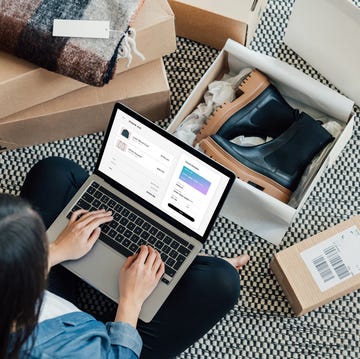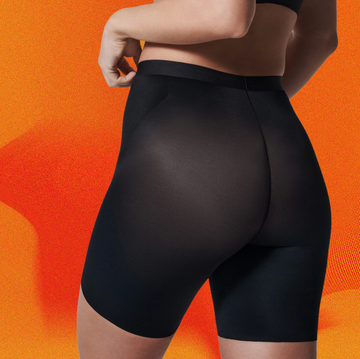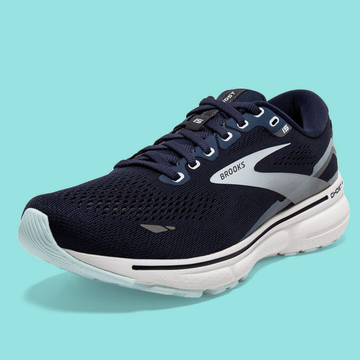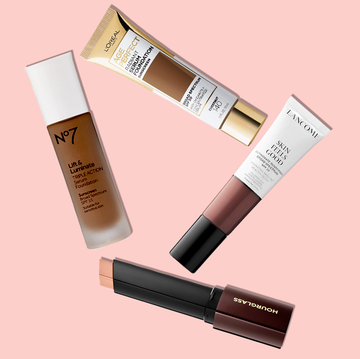We Walked for 300+ Hours to Find the Best Walking Shoes for Women
Shoes that are actually comfortable and supportive.

We've been independently researching and testing products for over 120 years. If you buy through our links, we may earn a commission. Learn more about our review process.
Walking is one of the healthiest forms of exercise, and the right shoes can set you up for success. The Good Housekeeping Institute experts and I evaluate the best women's sneakers for high- and low-impact activities, including the best walking shoes for women and men. "Research suggests that walking can reduce the risk of cardiovascular disease and improve longevity," says Stefani Sassos, Nutrition & Fitness Lab director and certified personal trainer. "A regular walking practice can even improve a person's cognition and also help decrease symptoms of anxiety and improve mood."
As the associate director of the GH Institute Textiles Lab, I have been testing walking shoes since 2018. I have evaluated over 50 pairs with hundreds of consumer testers who have logged over 300 hours of walking. To better answer your most pressing questions about the best walking shoes, I partnered with sports medicine doctors and podiatrists to analyze the construction of the shoes and narrow down the best styles that are comfy and healthy for your feet.
Pros
Cult-favorite shoe brand
Ample cushioning and arch support
High tester scores for traction
Comfortable even after walking 5 miles
Cons
Heel drop may be too high for runners
Size range: 5–13 (regular, narrow, wide and extra wide) | Weight per shoe: 8.8 oz | Heel drop: 12 mm | Colors: 30
Help prevent foot pain with a shoe that prioritizes stability and control. Brooks is a popular running shoe brand, but walkers love the Ghost series for its ample cushioning and comfortable heel. The Ghost 16 has a massive following for being a supportive, versatile sneaker that can easily transition from walking to running.
I wear a previous iteration of this style almost every day at the gym. These sneakers support my entire foot without feeling too heavy and I often use them on the treadmill because they have plenty of arch support and offer a stable fit. Even after walking five miles, my feet are still pain-free. Note that this pair features a larger heel drop, measuring 12 millimeters, which is likely too high for runners who land on the middle or front of the foot.
Brooks just launched the Ghost 17 and we are currently testing this new style.
TESTER NOTES: "The shoe felt supportive while standing for long periods of time (like at a concert) as well as when walking around a city," noted one tester who tried the Ghost 15. One tester with chronic foot pain said she usually finds "no shoes comfortable to wear, but these are amazing."
The sneakers got high marks across the board for cushioning, support and traction, with one tester saying it "didn't even feel like I was running on pavement while wearing these."
RELATED: Most Comfortable Shoes
Pros
Stretchy upper material
Popular on Amazon
Super-lightweight feel
Cons
Not all testers liked their appearance
Size range: 5–13 (regular and wide) | Weight per shoe: 6.07 oz | Heel drop: Not listed | Colors: 32
Not only are these Tiosebon sneakers by far the most affordable shoes in our roundup, starting at $20, but they also have tens of thousands of Amazon reviews. Medical experts we interviewed like how lightweight they are (about 6 ounces per shoe). They are completely lace-free and have a stretchy knit upper with a sock-like fit, so you can easily slip the shoes on and off.
Because these shoes don't offer as much support and stability as other featured sneakers, they're not well-suited for vigorous exercise. When I tested these shoes, I loved the easy slip-on design, perfect for commuting or quick errands — and the airy upper that never felt sweaty. I will say they were a bit narrow on my foot and would've fit better if they had laces.
TESTER NOTES: Testers raved about the cushioning. One tester said, "They didn't look like clunky orthopedic shoes, but they felt as if they were padded with 4 inches of memory foam." Testers didn’t rate the appearance as highly as other styles, though.
RELATED: Best Slip-On Shoes for Women
Pros
Designed to alleviate feet, knee and hip pain
Lightweight cushioning
Breathable fabric helps limit sweaty feet
Cons
May feel too stiff for some
Size range: 5–12 (narrow, medium, wide and extra wide) | Weight per shoe: 8.8 oz | Heel drop: 12 mm | Colors: 24
For ultimate support, the Brooks Adrenaline series not only has arch support built-in, but it offers a supportive design to help alleviate pressure on your feet, knees and hips. The shoes feature lightweight cushioning in the midsole and a breathable mesh upper to encourage airflow.
When I was experiencing foot pain, I relied on my pair of the Adrenaline GTS 23 (a previous version), which offered snug support throughout the shoe and was even comfortable during long distances. Because of the support features, it's a stiffer shoe, and I prefer the appearance of the Ghost shoes.
TESTER NOTES One tester, who is a registered nurse and tried the Brooks Adrenaline GTS 23, experienced no arch pain after a shift which tends to happen with other shoe styles. "Shoes were also breathable and my feet did not sweat or start to swell," they reported, giving perfect scores across categories including support, cushion, fit and appearance.
RELATED: Best Brooks Running Shoes
Pros
Slip-on design
Great for walking and workouts
Lightweight material
Cons
Less cushioning
Size range: 5–12 (regular and wide) | Weight per shoe: 6.3 oz | Heel drop: Not listed | Colors: 27
Weighing around 6.3 ounces per shoe, these New Balance sneakers are among the lightest we tested, and they were popular with our testers and experts. As a cross trainer shoe, they're great to wear during both walks and workouts.
Constructed with mesh at the front of the shoe, these sneakers allow a lot of freedom of movement, which podiatrists especially liked. The slip-on design features a tongue that stays put for easy on/off, making this a great commuter shoe too. We found that this shoe has a thinner midsole compared with other picks, which allows for quicker movement but offers less cushioning.
TESTER NOTES: Impressed by the comfort straight out of the box, one tester said, "Right when I put them on, they started molding to my feet." Giving high marks across the board for cushioning and comfort, testers unanimously said they would continue wearing these shoes. Testers credited the front mesh for making the shoes breathable and comfortable over bunions.
RELATED: Best New Balance Shoes
Pros
Received perfect scores for cushioning and support from testers
Trend-forward design details
Created specifically for a woman's foot shape
Cons
Made with less durable materials
Size range: 5–11 (regular and wide) | Weight per shoe: 8.7 oz | Heel drop: 11 mm | Colors: 14
Rykä is a popular brand for women's sneakers since it designs shoes specifically for the shape of women's feet. The podiatrists we consulted liked that the shoe offered good mobility with soft cushioning — great for walking and fitness classes alike. We liked the segmented outsole for traction on all types of walks but noted that the foam didn't appear as durable as other styles.
TESTER NOTES: One tester liked "how lightweight and breathable these were," and our panel of testers gave these shoes perfect scores for cushioning and support. One tester even said she felt like she was "walking on clouds." Unlike other walking shoes testers had tried, several called this pair "sleek" and "stylish."
Pros
Roomy toe box for wider feet
Springy foam
Versatile shoe, ideal for everyday wear and runs too
Cons
Some testers found the thick cushioning a little bulky
Size range: 5–13 (regular, narrow, wide and extra-wide) | Weight per shoe: 9.2 oz | Heel drop: 6 mm | Colors: 18
An overly cramped toe box can cause intense foot pain when you have wide feet. These New Balance sneakers are available in both wide and extra-wide sizing to ensure a proper fit without crowding. With a flexible knit upper, these shoes can comfortably accommodate bunions as well. Sports medicine physician Jordan Metzl, M.D. appreciated New Balance's shoes' excellent construction and thought they would be a good fit for people of all ages and with different fitness routines.
TESTER NOTES: Testers gave these shoes perfect scores for fit, comfort and cushioning after logging more than 60 hours working out in this style. One tester called this pair "very lightweight and breathable," and another said, "I find myself reaching for this pair over all of my other running and walking shoes whenever I leave my home."
Testers especially liked the cushioning foam, but some felt these shoes were a bit clunky. "I felt like it gave me a boost on long walks and hill work," commented one tester. "My feet felt less tired and it definitely gives a spring to the step."
Pros
Unparalleled cushioning
Supportive
Versatile
Cons
On the bulkier side
Size range: 5–11 (medium, wide and extra wide) | Weight per shoe: 9.3 oz | Heel drop: 5 mm | Colors: 6
The thick cushioning on this pair from HOKA can seem intimidating at first, but it's a game-changer if you're walking long distances or recovering from an injury. When I walk in my HOKA Bondi 8 shoes (the previous version), my knees feel supported and there's less pressure on my joints. The thick cushioning means these shoes are a bit bulkier and I found them to sometimes provide less stability, especially when on uneven terrain.
HOKA recently launched an updated Bondi 9 (the 8 is on the left while the 9 is on the right). The new style is a bit thicker while being lighter in weight.
TESTER NOTES: "There's a nice balance between comfort and support," noted one tester. "They feel plush yet structured on my feet." She especially liked that her feet didn't feel fatigued after being on her feet all day. When we interviewed avid walkers, many said the HOKA sneakers' cushioning is unparalleled, but many wished they were more affordable.
RELATED: Best HOKA Shoes
Pros
Adjustable strap for secure fit
Ideal for travel, according to testers
Contoured footbed for arch support
Cons
Toes aren’t protected from debris on trails
Size range: 5–12 whole sizes (regular and wide) | Weight per shoe: 12 oz | Heel drop: NA | Color: 10
These supportive sandals feature a contoured footbed for arch support and heel stability. You can adjust the ankle strap to ensure a tight fit, and the rugged outsole offers grippy traction on all terrain, including wet surfaces. These are available only in whole sizes — the brand recommends sizing down if you’re in between.
I have high arches and appreciate that this pair's firm foam helps keep them supported. The firmer foam is less bouncy than other foam sandals I've tried. I even wore them on a vacation in Spain and loved that I could wear them at the beach then dress them up later for a nicer dinner. The simple design worked for all occasions, making them a great vacation sandal.
TESTER NOTES: Testers traveled all over the world with these sandals and said they were comfortable on varying terrain. “I like how they offer a lot of support and fantastic traction,” noted one, while another said, “The arch support is next-level.” Users liked how they could be dressed up or down. But because they lack a covered toe box, feet may be exposed to debris.
Pros
Top scores for comfort
Hands-free slip-on design
Great for casual use
Cons
May not offer the best support or stability
Size range: 5–13 (regular and wide) | Weight per shoe: 10.2 | Heel drop: Not listed | Colors: 8
Kizik designs slip-on shoes that are easier to step into without having to adjust or pull them on with your hands. They feature a flexible back heel that immediately returns to its original shape after you step into the shoe — no untying or adjusting necessary.
I can confirm these sneaks perform as advertised — my foot perfectly fit inside the shoe after I stepped on the back silicone cage. No adjustment is needed. I keep the shoes by my door to quickly slip on for dog walks and often wear them while running errands. Note that they don't offer as much support or stability as some of the other shoes on our list.
TESTER NOTES: The Athens sneakers scored well among testers for cushion and comfort. "I've been wearing them for weeks and I expected the heel to cave in and the slip-on to get harder, but that didn't happen," reported one tester. Another added that they appreciated the simple design that didn't have obvious branding, but there were mixed reviews on the appearance of the shoe.
READ OUR FULL REVIEW: Kizik Slip-On Sneakers
How we test walking shoes

In recent evaluations, we've tested more than 50 different styles of walking shoes. In addition to evaluating each pair in the Lab, we sent shoes to consumer testers with a range of shoe sizes and foot shapes. Testers walked for at least two hours before giving feedback. In total, testers walked for more than 300 hours while evaluating the shoes. We even cut sneakers in half (as pictured) so podiatrists and other footwear experts can review the shoes and analyze the efficacy and longevity of the materials.
When evaluating walking shoes, our experts consider:
✔️ Comfort: How the shoes feel on your feet is the most important thing. Therefore, we rate comfort highly when analyzing testers' feedback, noting in particular the comfort of the footbed, tongue and ankle opening.
✔️ Support: The right footbed helps keep your feet properly supported while on the move, reducing strain on your arches. Testers gave extensive feedback and fit notes on each pair's arch support.
✔️ Weight: In the Lab, we weighed each shoe to nix overly clunky styles.
✔️ Construction: After sawing each shoe in half, podiatrists and other footwear experts reviewed the inner construction and foam to find the most supportive styles.
How to choose the best walking shoes

When trying on walking shoes, here are the best steps to take to help ensure you find a winning pair:
✔️ Discuss concerns with your podiatrist. If you are recovering from an injury or have consistent foot pain, we recommend discussing which shoes are best suited for your feet with a podiatrist or an orthopedist to help you find the most comfortable pair.
✔️ Pick them up before trying them on. Avoid heavy styles that will bog you down. One exception: If you have flat feet and need more support, a heavier style might be preferable to offer sufficient control.
✔️ Give the shoe a twist. Emily Splichal, D.P.M., says to twist the sneaker as if you're wringing out a towel. Our experts recommend styles with more twistability if you can handle it. It helps you develop stronger muscles from your feet to your glutes.
✔️ Try on as many styles as possible. There’s no one-size-fits-all shoe. Each brand — and even each style — varies in sizing and fit, which can have a big effect on your foot.
✔️ Find the right fit. Wiggle your toes to make sure the shoes aren't too tight, and walk a few laps around the store so you can avoid shoes that pinch or squeeze your feet. If you have any existing foot pain, Dr. Metzl suggests going with the pair that "makes the pain go away when you're walking around the store," as that's a good indicator you've found a good shoe for you.
✔️ Choose comfort over everything else. Dr. Metzl stresses that comfort is key. Regardless of the product claims, you should be "as objective as you can for support and comfort." And trust your instincts — your feet will know which shoe is right. If your toes feel cramped or your heels are rubbing on the backs while you're testing the shoes, ditch them. It'll only get worse the more you walk in them.
Terms to know when shopping for walking shoes

Sneaker terminology can be confusing, so it's hard to know what actually matters when you're shopping. Some of these keywords might be important to some shoppers and not to others. Below, our experts explain all of the main walking shoe terms so you know what to look for before you buy:
✔️ Heel drop refers to the difference in the height of the midsole at your heel and at the ball of your foot. Most walking shoes tend to have a lower heel drop (around 4 to 8 millimeters) that's more like being barefoot while running shoes have a larger difference (10+ millimeters). It comes down to personal preference, so check out your current pair of shoes and measure the heel drop to see what you like or dislike. Foot and ankle surgeon A. Holly Johnson, M.D. advises that for most people, "no major heel drop" is best for walking shoes. Note that many brands choose not to list heel drop.
✔️ Pronation is when your ankle leans inward, and supination is when your ankle leans outward. Ideally, everyone's ankles would have neutral alignment, but many people are pronators or supinators. Some styles are designed specifically for each type of ankle alignment, but many are for neutral alignment.
✔️ Surface types may be listed for the shoes, which refers to where the sneakers can be worn: road, track, treadmill, trail, etc. This is most important for trail shoes to ensure that the outsole has proper traction to help keep you safe.
✔️ Cushioning can vary immensely for different walking shoe styles. Dr. Johnson says that thick cushioning can help "lessen impact per step and absorb impact." She also finds that cushioning for the arches "helps with flat feet and overpronators to keep the foot supported." But too much cushioning can feel bulky, so "you can feel unbalanced." Thick-cushioned shoes are heavier too. Generally, very cushioned walking shoes are best for extreme long-distance walkers and people with specific injuries who need more support.
Can you wear running shoes while going for a walk?

Generally, yes, the same shoes you love to wear while running can also be worn on a walk. Walking and running shoes can include different design features, but some styles are intended for both activities. Therefore, it's most important that the shoe is comfortable and supportive on your foot when walking for exercise. Running shoes tend to have more control to brace for impact on the sole, and walking shoes have a bit more flex and bend. Splichal recommends running only in running sneakers, especially ones with more cushioning for long-distance running.
Though sneakers may look alike, there are differences when it comes to which kind of sneaker is best suited for certain types of physical activity. Indoor cycling shoes and shoes for hiking have totally different designs, but running and walking shoes tend to feature similar construction. Dr. Johnson found that sometimes the only difference between a brand's running shoe and walking shoe is marketing. "If the shoe is comfortable, it is the right shoe for you," she says.
Why trust Good Housekeeping?

The Good Housekeeping Institute Textiles Lab has been a leading expert on footwear for decades.
Emma Seymour is the associate director of the Textiles, Paper and Apparel Lab. She has overseen Lab and consumer tests for a variety of footwear categories, including the walking shoes above, running shoes and hiking shoes as well as other fitness categories like yoga mats, workout leggings, sports bras and more. With a degree in fiber science and apparel design from Cornell University, she has extensive research experience, particularly focused on athletic wear. In addition to her product quality expertise, she is an avid walker who loves walking for exercise and has even walked the full length of Manhattan multiple times. She regularly wears Brooks Ghost 15 Neutral running shoes and Adidas Women's Ultraboost 21 running shoes depending on her walking workout.
For this story, she also spoke to the following experts:
- Jordan Metzl, M.D., is a sports medicine physician at the Hospital for Special Surgery in New York City.
- Emily Splichal, D.P.M. is a podiatrist at the Center for Functional and Regenerative Podiatric Medicine in Chandler, Arizona.
- A. Holly Johnson, M.D., is a foot and ankle surgeon at the Hospital for Special Surgery in New York City and a team physician for the New York Liberty WNBA basketball team.
Emma Seymour (she/her) is the associate director of the Good Housekeeping Institute's Textiles, Paper and Apparel Lab, where she has led testing for luggage, pillows, towels, tampons and more since 2018. She graduated from Cornell University with a bachelor of science in fiber science and apparel design and a minor in gerontology, completing research in the Body Scanner Lab on optimizing activewear for athletic performance.

Readers Also Read

What Our Readers Can't Stop Shopping This Month

Amazon Officially Announced October Prime Day

17 Best Nordstrom Rack Deals We Found in September

The Best Shapewear

















